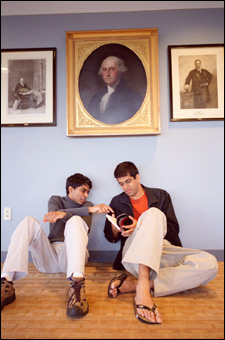Undergrads bring visibility to ‘Invisible Citizens’:
IOP-supported book details youth attitudes toward politics

The post-Sept. 11 spike in youth interest in national politics is fading and, though the war on terror rages on, U.S. politicians and community leaders getting back to business as usual are again turning off the generation that will make up America’s future leaders.
Those were the conclusions of two Harvard undergraduates, Ganesh Sitaraman and Previn Warren. The two teamed up to survey the attitudes of America’s youth and young adults and test the hypothesis that Sept. 11 provided both a wake-up call and a change of heart to a generation thought to be disinterested and disconnected from national politics.
The call by the 9/11 terrorists may have awakened America’s youth, but Sitaraman and Warren warn in their book “Invisible Citizens: Youth Politics After September 11,” published in April, that the renewed interest was only for a moment that is rapidly passing.
“Our generation cares too much about real people and issues that affect them to waste their time on what they see as an endless batch of would-be leaders who are too busy responding to polling data to actually lead,” the two conclude in “Invisible Citizens.” “This perception is born less out of apathy and more out of disgust. A lack of courage has inspired a lack of engagement. And it has led to what may be the truly greatest tragedy of the 21st century, our generation’s disavowal of the political realm.”
The book, created with the support of the Kennedy School of Government’s Institute of Politics (IOP), explores in greater depth attitudes revealed in several IOP surveys of America’s youth. The two, listed as editors, were aided by a team of 11 fellow Harvard undergraduates who collected responses from young adults across the country representing a wide variety of socioeconomic groups.
IOP Director Dan Glickman said the book is an unusual effort for undergraduates. Students involved in the project worked hundreds of hours and performed an enormous service to illuminate a serious problem in American politics, Glickman said.
“The good news is that most young Americans, and especially students, are interested in voluntarism and related forms of public service. The bad news is their interest in politics and political campaigning at all levels, and particularly at the federal level, continues to be very low,” Glickman said. “Our democracy cannot withstand too many generations so alienated from their political system, and the book will be helpful in understanding these trends better.”
Sitaraman and Warren caution against taking their generation’s disenchantment with politics as a general sign of disengagement from society and civic duty. On the contrary, they say, America’s young people are widely engaged in community, nonprofit, and charitable efforts aimed at helping make their communities better places to live.
Though admirable, the two juniors say, their peers’ community focus to the exclusion of national politics is dangerous because the reforms and changes that can help the causes they are interested in at the local level can often only be effected at the state or national level.
“It’s very important to realize that direct community service is very effective,” Sitaraman said. “But there’s things that can sometimes only be done on a larger scale. Our generation needs to understand that better.”
Apathy, Warren said, is the wrong word to describe his generation’s attitude toward politics. Rather, he termed his peers’ attitude as cynical, the result of growing up in an era where bureaucracy is entrenched, money is paramount, and the line between campaigning and advertising is extremely blurry.
Sitaraman credited the fast-forward consumer culture of the 1990s, saying the decade’s consumerism pervaded politics. The result was campaigns run as much according to polling data and focus-group opinions as by ideological principles and a desire to serve the public.
“The difference now [from earlier generations] is that spin has become an art form, consultants have become dominant,” Sitaraman added.
In their book, the two suggest several ways to boost engagement, including loan forgiveness in exchange for government service, higher entry-level salaries in the government sector, more noncombat positions in the military, a stronger outreach effort by elected officials toward children and youth, and a school curriculum that puts greater emphasis on civic responsibility.
Warren said America’s youth has an intuitive understanding of what’s in the book, so it’s aimed not at them but at the adults running things today, from parents to teachers to government officials.
“We’re trying to present our generation to the people in power,” Warren said.




